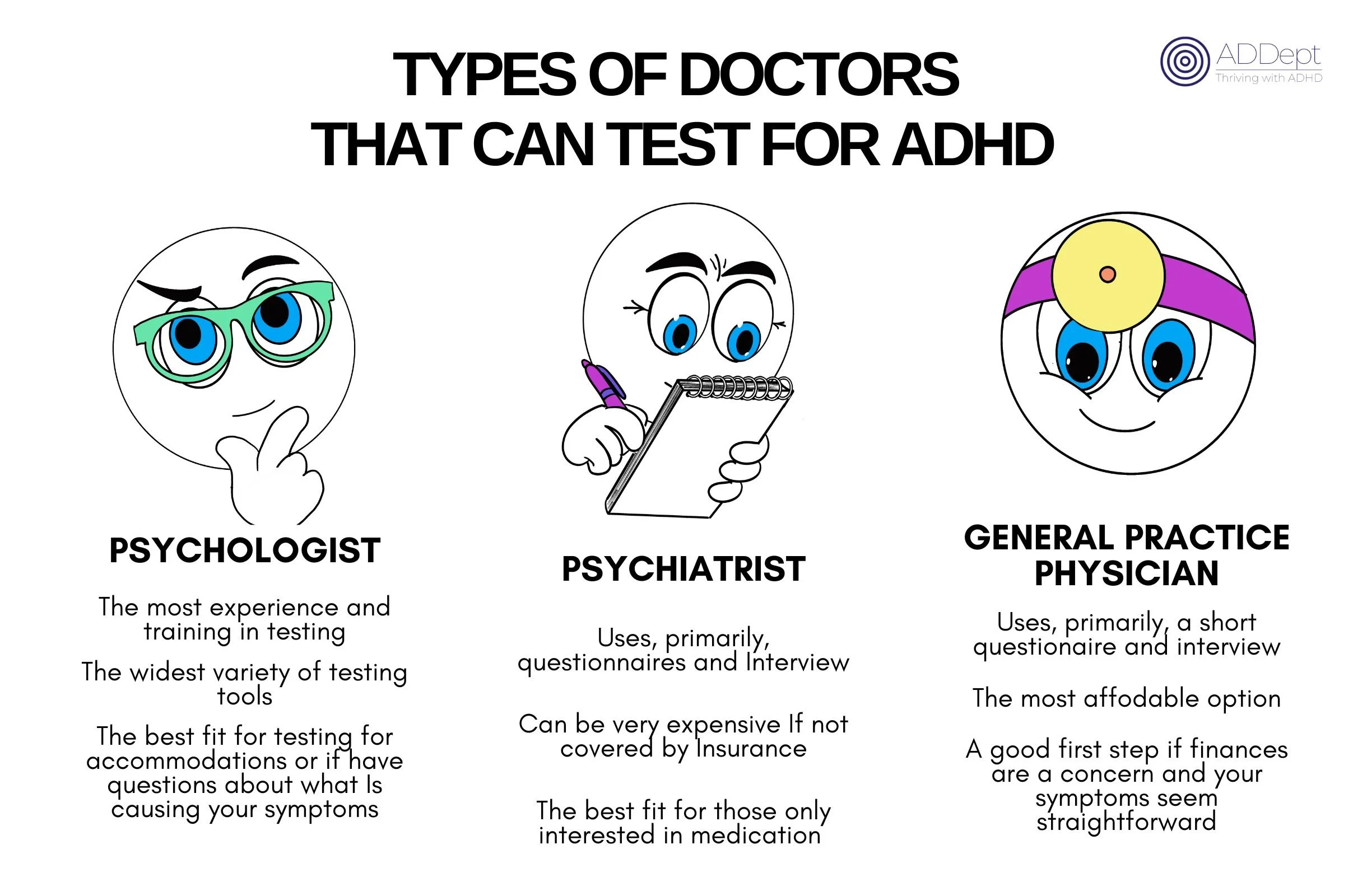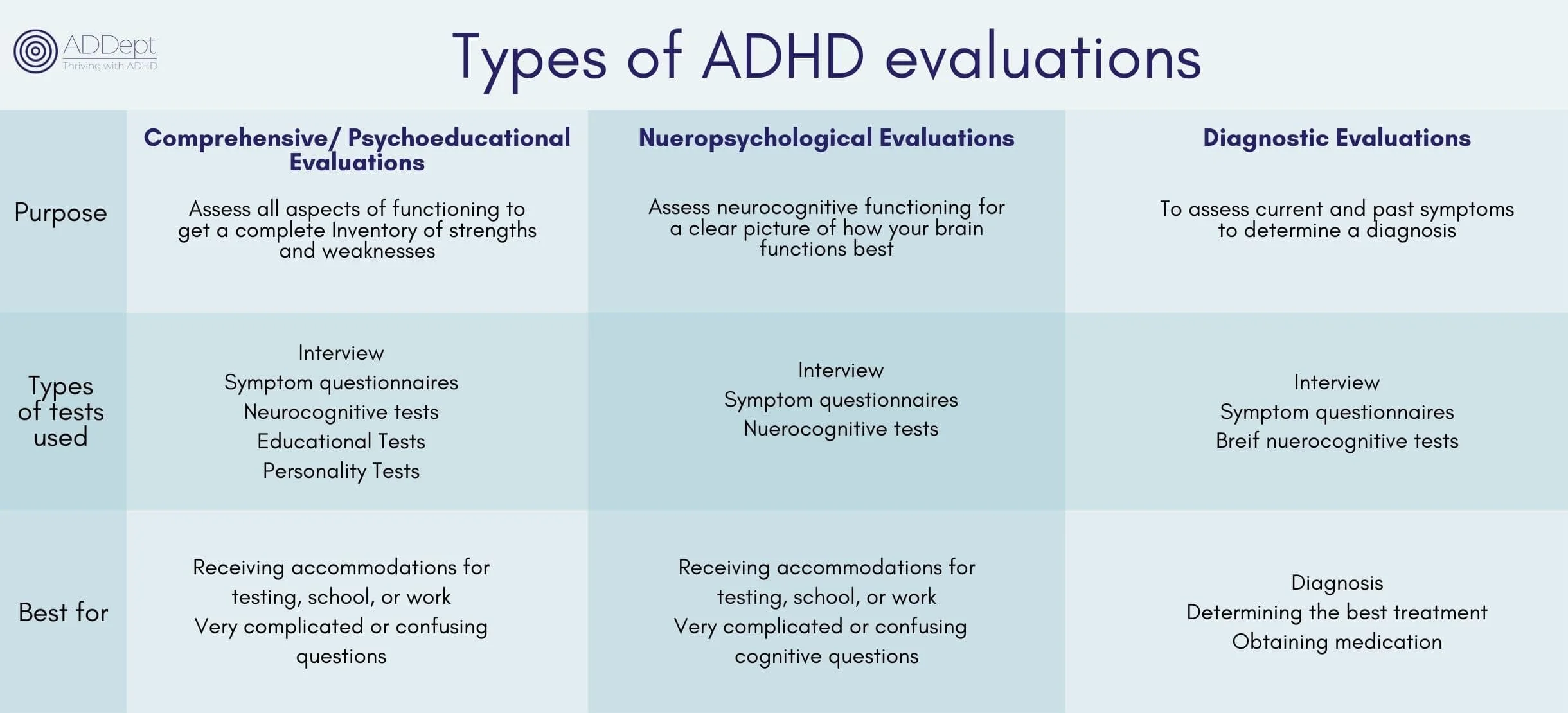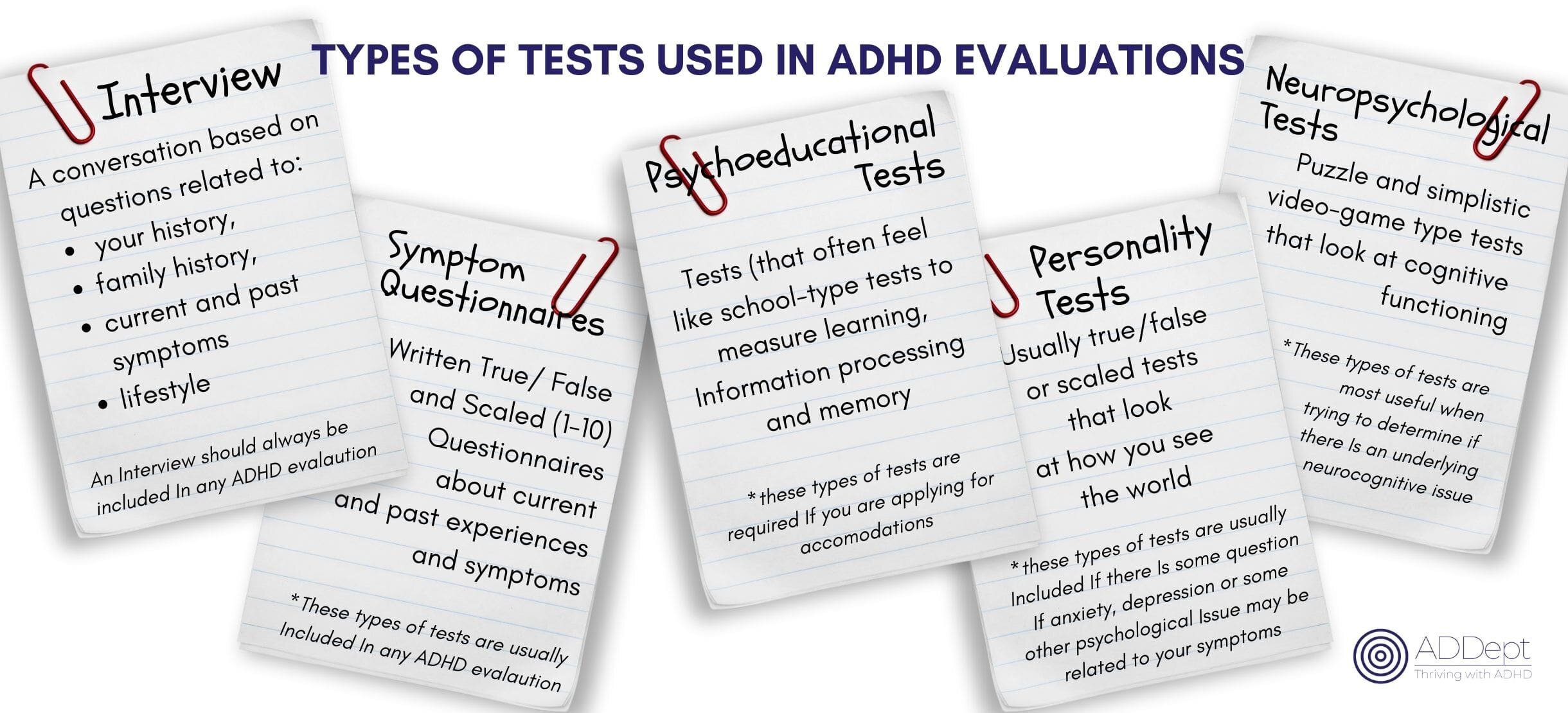How to Get Diagnosed with ADHD
Your Ultimate Guide to Clarity and Understanding [2024 Update]
Trying to get an accurate diagnosis can feel overwhelming and confusing, but getting a specialized assessment is essential to getting the best treatment possible. Psychologists, psychiatrists, and general physicians are all capable of diagnosing ADHD, but there are some circumstances that call for one over the others. Read on to learn more about which type of evaluation is right for you and what the steps are to getting an accurate evaluation.
Maybe the older you get, the more you realize- “No, not everyone struggles to focus like I do”…
Or maybe it’s the growing mountain of unfinished tasks or the mind fog that descends without warning…
Or perhaps it’s the way your child’s ADHD diagnosis and testing reports eerily mirrored your own lifelong struggles…
Could it be that the brain you’ve been navigating for decades isn’t quite like everyone else’s?
For many adults, the realization that their brain works differently dawns slowly, often triggered by life’s increasing complexities. It’s a moment of recognition, a flicker of doubt about what’s “normal.” And then comes the question: Now what?
Should I get tested for ADHD?
Often, the first step after you start to suspect that your brain might be struggling, like so many ADHD brains do, is to get tested.
Unmasking the Real Issue
Trying to determine if you have ADHD can be a frustrating puzzle.
Symptoms like trouble focusing, impulsive behavior, and overwhelming energy often get labeled as ADHD. But the truth is, these challenges can also be signs of many other things, like: depression, anxiety, OCD, bipolar disorder, or even sleep problems.
While these conditions might share similar symptoms, their underlying causes and treatments are vastly different. That’s why it’s crucial to get a specialized evaluation to help determine the best course of action.
The Many Faces of ADHD
ADHD isn't a one-size-fits-all condition. Beyond the classic symptoms of inattention, hyperactivity, and impulsivity, ADHD presents itself in countless ways. From the energetic and impulsive to the quietly distracted, the spectrum is wide. Gender, race, culture, and intelligence can further shape how ADHD manifests in individuals.
This diversity makes accurate diagnosis challenging. What's more, other conditions like anxiety, depression, or OCD can mimic ADHD symptoms, adding another layer of complexity. That's why seeking a specialist who understands the multifaceted nature of ADHD is crucial, especially for those from marginalized communities.
When you might not need testing:
However, there are some times when testing isn’t necessary. Your symptoms may be relatively mild, and you aren’t interested in medication. Or your symptoms seem very straightforward, and you just want to get started on addressing the symptoms in therapy. Or, perhaps you’ve received a diagnosis before. Then it, may make sense for you to start by treating your symptoms rather than adding steps into the process.
What kind of Doctor tests for ADHD?
If you've decided that testing is the right path, it's essential to choose an evaluator who is well-versed in ADHD diagnosis. Look for someone with experience assessing a diverse range of individuals, including women and people of color, as ADHD can manifest differently in various populations. While many healthcare professionals can evaluate for ADHD, their approaches may vary depending on their specialty.
The primary professionals that can assess for ADHD are:
Psychologist:
Psychologists have the widest variety of tools at their disposal to help assess ADHD. They can perform neuropsychological testing, cognitive testing, personality testing, symptom questionnaires, and interviews.
Who are psychologists best for?
If there is any doubt or question about precisely what may be causing your symptoms, a psychologist who specializes in ADHD is often the best option for ADHD testing.
Psychiatrist:
Psychiatrists usually assess for ADHD with a few short questionnaires about your current symptoms and a longer interview.
Who are psychiatrists best for?
If you are only interested in medication as a possible treatment for ADHD, then being assessed by a psychiatrist is often a great first step.
General Practitioner:
GPs and Family Medicine doctors are sometimes willing to offer a brief symptom questionnaire and discussion to arrive at a diagnosis. However, given the limited amount of time they have with their patients, they often are not able to differentiate between all the various disorders that can mimic ADHD symptoms.
Who are GPs best for?
GPs are often the most affordable option, so if finances are tight and your symptoms are straightforward, they may be an excellent option for you.
Is there one definitive test for ADHD?
No. Unlike many physical conditions like diabetes or anemia, there is no blood test or other definitive assessment for ADHD. The diagnosis, instead, is made from looking at a combination of your current symptoms, your history of symptoms, and how your brain processes information.
What’s the difference between ADHD tests and an ADHD evaluation?
ADHD evaluations are made up of specific tests, some of which test only for ADHD symptoms, while others test for a variety of other symptoms that sometimes look like ADHD.
What type of evaluation can I get for ADHD?
If you go to a psychologist for ADHD testing, you may be offered a variety of testing options.
Comprehensive Evaluation
Comprehensive evaluations look at all aspects of your neurocognitive (how your brain does things like switch tasks or remember short-term information) and psychological functioning (how you tend to see the world and cope with stress) to establish a full survey of your strengths and weaknesses. This type of testing not only arrives at a definitive diagnosis but also personalized recommendations for dealing with your symptoms. Comprehensive testing includes educational, neuropsychological, personality, and symptom measures and often takes between 6-10 hours.
Nueropsychological Evalaution:
Neuropsychological evaluations are similar to comprehensive evaluations but with a greater focus on neurocognitive functioning. Neuropsychological testing gives you a very clear picture of how your brain processes information and how it functions best but it also takes a long time (5-7 hours) and can be quite pricey.
Diagnostic evaluations:
For most adults, I usually recommend a diagnostic evaluation that includes some brief neurocognitive measures but mostly consists of symptoms questionnaires, both about childhood and adult symptoms. This type of testing is often just as (if not more) accurate and significantly less costly, usually taking 1-2 hours.
What types of tests are used for an ADHD evaluation?
Interview
During an interview, the doctor will ask a series of questions about your current symptoms, your current lifestyle, and your history.
Symptom Questionnaires
Symptom questionnaires are usually yes/no or scaled tests that ask about current or childhood symptoms and experiences. Symptom questionnaires almost always make up at least part of any ADHD testing.
Neuropsychological Measures
Neuropsychological or Neurocognitive measures look at the way your brain functions and processes information. It will measure your speed, accuracy, and ability to switch tasks, remember new information, or order and prioritize information.
They often feel like puzzles or simplistic video games. Neuropsychological measures are often required for academic accommodations or if it is particularly unclear if the symptoms you are experiencing are due to ADHD or another type of neurological issue.
Psychoeducational Measures
Psychoeducational tests look at the way you learn. They feel a lot like school-type tests and they help gauge what issues may be impacting your learning and performance. These types of tests are often required for applying for academic accommodations.
What should I expect if I get tested for ADHD?
If you decide to get tested for ADHD, you can expect to follow these basic steps:
Choose a doctor
Discuss the testing options
Fill out symptom measures and questionnaires ahead of time
Depending on the type of testing, you will then attend 1-4 testing sessions. Some of these will involve just sitting and talking about your symptoms and your history, while others will involve tests—some of those will feel like school tests, some will be more like puzzles, and others will be true/false questions about how you feel.
The tests are scored and interpreted. Depending on the length of the evaluation, this process can take 1-3 weeks.
The feedback session: The evaluation results are summarized in a report, which is given to you during a final session, during which you discuss the findings and recommendations.
Where can I get tested for ADHD?
If you are in one of the states below, one of the brilliant psychologists at The Center for ADHD (totally biased, sure- but also true!) would be happy to help you figure out what type of testing is right for you.
Outside of those states, Psychology Today is a wonderful resource for providers that can help you get tested for ADHD. Just be sure to interview your clinician to be sure that they have experience working with folks like you with ADHD.
Want to know how to ensure you are getting the ADHD expert you deserve? Check out this post: 5 questions to ask a therapist before starting ADHD therapy or testing.
Tips and Tricks for getting the best ADHD testing:
Find an expert: Find a psychologist or psychiatrist that is trained and experienced in assessing for ADHD. It is a tricky thing to diagnose and can be easily mistaken for other disorders. This is particularly true for women and ethnic minorities, so you want to make sure you work with someone who understands the many ways that ADHD can present.
Make sure the type of testing meets your needs: Ask what type of testing the clinician will use and make sure that that type of testing will meet your current and future needs. For example, if you may want some type of work or school accommodations in the future, then you want to ensure that the testing you get will meet your school/work/testing agency requirements.
Keep in mind the timeline of testing. Testing usually takes between 2-8 weeks from start to finish. If you need your testing for school or medication, be sure you give yourself plenty of time.
Set up a system for getting forms filled out: The process of ADHD testing is, unfortunately, not very ADHD-friendly. There are forms to fill out, appointments to make, and follow-ups to keep track of. Create a system or recruit someone to help keep you accountable while you go through the process.
Keep in mind that testing is an investment in your future. Testing for ADHD is not cheap, particularly the more comprehensive evaluations. But getting a thorough understanding of precisely what is going on for you can save you tremendous amounts of time and money in the future by allowing you to drill in on the solutions that have the most excellent chance of working.
Testing for ADHD can feel overwhelming, but it can also be a wonderfully healing and clarifying process. Discovering the origins of the struggles that you are having can feel like it puts a new pair of glasses on your perspective.
Ready to shift from
meltdown to mastery?
This online course has been designed specifically to help teach the strategies ADHD brains need to help them move from overwhelm and meltdowns to confident emotional mastery.
Want to know more about
thriving with ADHD?
Check out these other articles:














ADHD Packing Tips: Master Stress-Free Travel with these ADHD Hacks